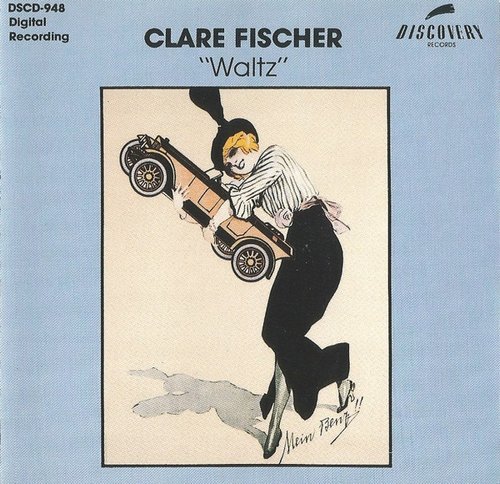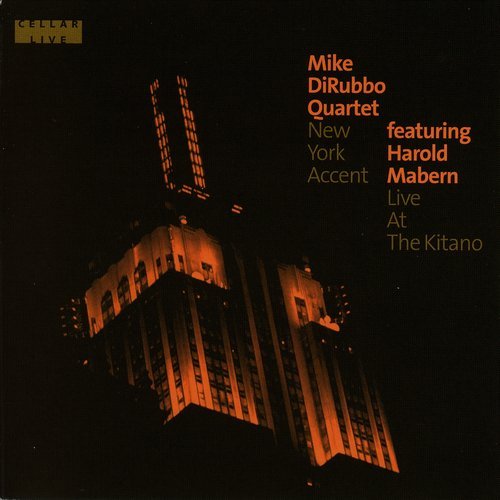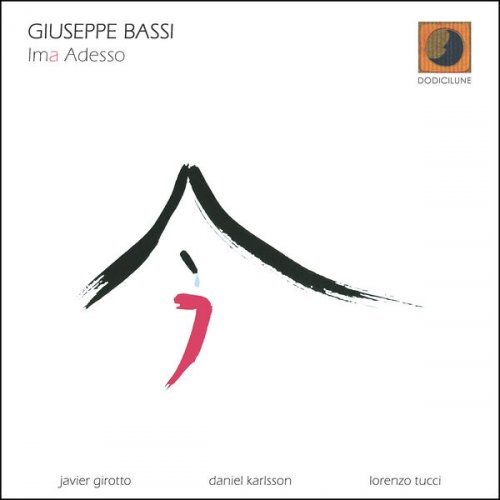Fredrik Malmberg - Soavi Accenti: Harmony of Voices (2007) [SACD]
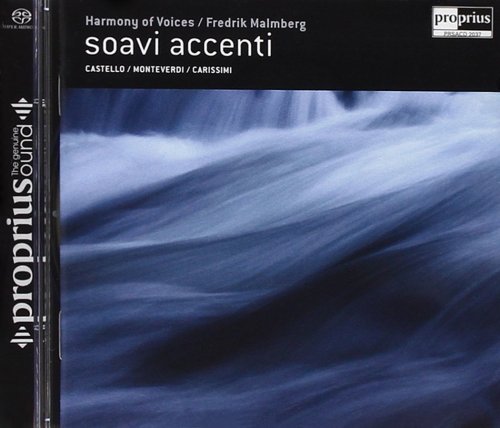
Artist: Fredrik Malmberg
Title: Soavi Accenti: Harmony of Voices
Year Of Release: 2007
Label: Proprius [PRSACD 2037]
Genre: Classical
Quality: DSD64 image (*.iso) / 2.0 > 1-bit/2.8224 MHz
Total Time: 01:05:51
Total Size: 3,1 GB (+3%rec.)
WebSite: Album Preview
The musical changes which took place in Italy in the first decades of the 17th century are well summarised in the booklet of this disc. "This was the period when the polyphonic madrigal gradually gave way to the solo song with chordal accompaniment, the church modes were replaced by new, harmonic tonalities, new musical genres like opera and oratorios were introduced and the boundaries between the vocal and instrumental idioms became much sharper". All these things are demonstrated on this disc, which features examples from some of the genres in vogue at that time in Italy.Title: Soavi Accenti: Harmony of Voices
Year Of Release: 2007
Label: Proprius [PRSACD 2037]
Genre: Classical
Quality: DSD64 image (*.iso) / 2.0 > 1-bit/2.8224 MHz
Total Time: 01:05:51
Total Size: 3,1 GB (+3%rec.)
WebSite: Album Preview
The oeuvre of Claudio Monteverdi reflects several of these developments. In his early books of madrigals he linked up with the style of the Italian madrigals of the second half of the 16th century. In his later books he tried to adapt his madrigals to the emerging opera. The madrigals on this disc have little in common with the traditional madrigal style of composers like Marenzio or De Wert. The disc opens with 'Zefiro torna', a sonnet by Ottavio Rinuccini, set for two voices with basso continuo. The text begins with a line which has given this disc its title: "Zephyr returns and with sweet accents makes pleasant the air and ruffles the waves" (Zefiro torna e di soavi accenti l'aer fa grato e il piè discoglie a l'onde). The bass part is a chaconne, which is repeated consistently until the last stanza where the mood of the sonnet changes: "Only I, in deserted and lonely woods beweep and sing, as my fate decrees, the fire of two fair eyes and my torment". At the closing stage of this stanza the chaconne bass returns. The madrigal gets a very theatrical performance here, thanks to the excellent declamation of the two tenors and their use of the messa di voce.
A repeated bass is also the foundation of the next item, 'Chiome d'oro', which is much more light-hearted than the previous piece. That doesn't quite come out here, as the tempo is a bit too slow. The declamation of the two female singers could have been better too.
The third piece by Monteverdi is one of his most famous compositions, the so-called 'Lamento della ninfa'. I find it a little pale: the male voices are rather bland and the declamation of Lena-Susanne Norin is less than ideal. I have heard better performances of this particular work.
The two sonatas by Dario Castello show that "the boundaries between the vocal and instrumental idioms became much sharper", as the liner notes say. They display a great amount of virtuosity, and the possibilities of the violin are fully exploited. At the same time the influence of the opera on instrumental music can't be overlooked here. Their dramatic character is reflected by the succession of strongly contrasting sections and the use of daring harmonies. The instrumentalists of the ensemble give very colourful performances of these two sonatas.
Giacomo Carissimi was one of the main composers in Rome around the middle of the 17th century. He was famous for his oratorios and his cantatas. As late as in the second half of the 18th century his music was still admired, as this quotation from the British music historian Sir John Hawkins shows: "To Carissimi is owing the perfection of the recitative style; this species of music was invented by Jacopo Peri and Giulio Caccini (…) and greatly improved by Claudio Monteverde; Carissimi excelled in imitating the inflections of the human voice, and in uniting the charms of music with the power of oratory". On this disc compositions from both genres mentioned above prove the truth of this assessment.
First the cantata 'Apritevi inferni' is performed: it begins with a long recitative which is followed by a dacapo aria. The cantata may appear like a secular work, but in fact its content is religious: "Open up, Hell, if I, with rebel desires, do not devote my inner thoughts to the King of the stars. / Hear me, oh Heaven! Shoot out vengeance in sharp arrows, if it should happen that God complained of my heart". Even more explicit is the aria: "To him who on earth does not obey God, may Heaven enlist a conspiracy; and may indignant Nature order for him nothing but war."
This cantata is one of Carissimi's most dramatic and is musically very demanding. It asks for a large tessitura and contains many big leaps and long melismas. And as if this is not enough, the character of the piece and its content dictate a pretty fast tempo. Leif Aruhn-Solén sings this cantata admirably. Sometimes he is less than comfortable at the highest extreme and in the lowest notes in the recitative, but in the aria he masters the notes at both ends very well. Perhaps the declamation in the recitative could have been a little sharper, but the text is delivered quite well. The instrumentalists give a dramatic performance of the basso continuo part, but I regret the constant change from harpsichord to organ in the recitative; totally uncalled-for in my view.
The oratorio 'Vanitas vanitatum' is infrequently performed and recorded; hence it is all the more welcome. It contains two parts, the first of which is a setting of words from Ecclesiastes. Every stanza ends with the refrain "Vanitas vanitatum et omnia vanitas" (Vanity of vanities, all is vanity). In the second part a free poetic text draws conclusions from this verdict: "Hence, O mortals, learn ye that the joys of the world are empty, its labours vain, its honours fleeting, its favours false, that all is vanity and but a shadow". The next stanzas end all with a harsh conclusion: "Where are the famous kings that gave the world its laws, where the leaders of peoples, the founders of states? They are dust and ashes". And: "where is Athens, where Carthage, and the like of ancient Thebes? Only their name surviveth".
The stanzas are set for solo voices and the refrains are sung by the tutti. At several moments Carissimi uses harmony to express the text, for instance in the second part on the words "Heu, heu, nos miseros" (alas, alas, for we are wretched), or shifts in tempo, like the speeding up on "sicut aquae dilabimur" (like the waters shall we run out).
All the nuances in the oratorio are well realised by the ensemble and its members in the solo sections. The instruments also considerably contribute to the dramatic power of this beautiful and very expressive work.
At the end the programme returns to Monteverdi with one of his most expressive madrigals, 'Tempro la cetra', which is preceded and concluded by an instrumental sinfonia. Johan Linderoth is giving a very powerful and emotional interpretation of the text, a sonnet by Giambattista Marino: "I tune the lyre, and to sing the glories of Mars, apply myself to pen and poetry." Very moving is how Linderoth sings the concluding phrase: "may sleep in Venus' lap, lulled by your song". The Sinfonia which follows ends with a repeat of the opening of the piece, and is played here with lavish ornamentation.
It brings to a close a recording which I rate highly, even though one can't overlook that the performers are not Italian and that some of the pieces could have been performed with a little more drama. That said, the overall achievement of these Scandinavian musicians is impressive. The brilliance and emotional character of this repertoire is well communicated by this fine ensemble.
musicweb-international.com
Tracks:
Claudio Monteverdi:
1 Zefiro Torna 6:22
2 Chiome D'oro 3:17
Non Havea Febo Ancora (Claudio Monteverdi):
3 Non Havea Febo Ancora 1:24
4 Non Havea Febo Ancora: Amor (Lamento Della Ninfa) 3:59
5 Non Havea Febo Ancora: Si Tra Sdegnosi 0:49
Dario Castello:
6 Sonata Duodecima Per Due Soprani E Trombone 7:37
Apritevi, Inferni (Giacomo Carissimi):
7 Recitativ 5:18
8 A Chi Dio - Aria 3:30
Dario Castello:
9 Sonata Undecima Per Due Violini E Trombone 5:33
Vanitas Vanitatum (Giacomo Carissimi):
10 Vanitas Vanitatum 11:24
11 Hinc Mortales 6:44
Claudio Monteverdi:
12 Symphonia Tempro La Cetra 9:45
Personnel:
Chorus – Harmony Of Voices, consisting of:
Ulla-Carin Börjesdotter, soprano
Lena-Susanne Norin, mezzosoprano)
Leif Aruhn-Solén, Johan Linderoth, tenor
Ove Petterson, bass
Ann Wallström, Stefan Lindvall, violin
Joel Sundin, Rastko Roknic, viola
David Gammelgård, cello
Mattias Frostenson, violone
Anders Ericson, theorbo, guitar
Karl Nyhlin, archlute
Conductor, organ, harpsichord – Fredrik Malmberg
![Fredrik Malmberg - Soavi Accenti: Harmony of Voices (2007) [SACD]](https://www.dibpic.com/uploads/posts/2023-05/1684227085_soavi-accenti-harmony-of-voices-malmberg-back.jpg)
![Eero Koivistoinen - For Children (1970) [2006] Eero Koivistoinen - For Children (1970) [2006]](https://www.dibpic.com/uploads/posts/2026-02/1771615516_ff.jpg)
![Dave Slonaker Big Band - Shifty Paradigms (2026) [Hi-Res] Dave Slonaker Big Band - Shifty Paradigms (2026) [Hi-Res]](https://www.dibpic.com/uploads/posts/2026-02/1771506144_eu5h6bbhmvwxe_600.jpg)
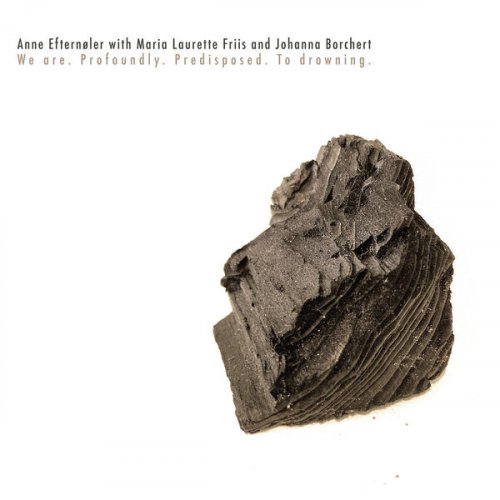
![Noga - Heroes in The Seaweed (2025) [Hi-Res] Noga - Heroes in The Seaweed (2025) [Hi-Res]](https://www.dibpic.com/uploads/posts/2026-02/1771663366_nhs500.jpg)

![William Warfield, Leontyne Price, Cab Calloway, RIAS-Unterhaltungsorchester, Alexander Smallens - Gershwin: Porgy and Bess (Live) (2008) [Hi-Res] William Warfield, Leontyne Price, Cab Calloway, RIAS-Unterhaltungsorchester, Alexander Smallens - Gershwin: Porgy and Bess (Live) (2008) [Hi-Res]](https://www.dibpic.com/uploads/posts/2026-02/1771309017_cd-cover-01.jpg)
